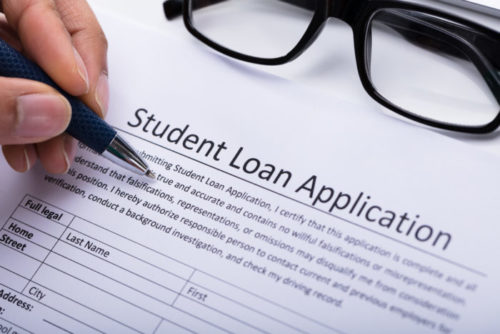If you’ve been dealing with bad credit, you may already know how tough it is to qualify for a loan and prove you’re a trustworthy borrower. With a bad credit score, lenders aren’t quick to offer you substantial lines of credit with high loan amounts because they may not think you can be counted on to pay them back.
If you need a student loan to pay for your education, don’t assume you’ll only qualify with a good credit score. If you’re working to increase your credit score, you may still be able to qualify for student loans to pay for your education. While your poor credit score may limit your loan options, there are ways to potentially obtain a student loan that will assist with your educational expenses.
Table of Contents
Can You Get a Student Loan With Bad Credit?
Even if your credit report isn’t favorable and your credit score is low, you may still qualify for a student loan. Your options will be more limited than a student who has a good credit history and a higher score. However, you may still be approved for a loan that will help pay for your tuition, student housing, and books while you’re in school.
With a low credit score, it may be harder to qualify for certain types of student loans. As a student with a low credit score, the loan terms you’re offered will not be as favorable as what’s offered to a student with better credit history.
You may also be asked to provide additional information, a co-signer, or other reassurance that you’re a worthy borrower, while students with more favorable credit reports may not. However, if you’re willing to jump through these hoops so the lender feels comfortable taking a risk on you, you’re more likely to be offered a student loan.
How to Get a Student Loan With Bad Credit
Even if you have bad credit, there are still a few options you may qualify for when it comes to student loans.
Federal Loans
Federal student loans are your best bet if you’re applying with bad credit. Since these loans are based on your financial need and not your creditworthiness, you’re more likely to be approved for a loan through the federal government.
Depending on the type of federal loan you qualify for, you may even be offered a low interest rate. Most federal student loans also offer repayment plans that cater to the income you earn after you’ve graduated.
Private Student Loans
When you apply for a private student loan, you’re applying directly through a lender. Therefore, your credit history and score are taken into consideration when determining whether you qualify and the loan terms you’re offered.
Private lenders may analyze your studies and career plans to estimate the salary you’re likely to earn when you graduate. Your potential salary is taken into consideration when deciding the loan amount and terms you’re offered.
With a bad credit score, if you’re eligible for a student loan, a private lender isn’t likely to offer you favorable terms. You may be dealing with a high interest rate or low loan amount. If this is the case, it may be more beneficial to apply for a federal loan or bring on a responsible co-signer.
Find a Cosigner
You may qualify for a federal or private school loan without a cosigner, but the terms you’re offered will be more favorable with one. Bringing on a cosigner with a strong credit history and high credit score takes some of the risk away from the lender. With a cosigner, a lender will feel more comfortable offering you a higher student loan amount with more favorable terms.
It’s important to discuss the responsibilities and risks with the cosigner before bringing them on to apply for a student loan with you. If you don’t pay back the loan, your cosigner is responsible for making these payments on your behalf until the balance is paid off.
At a certain point, once you’ve proven yourself as a responsible borrower, you may qualify to remove the cosigner from the loan. If you qualify and choose to release the cosigner, you’re solely responsible for paying back the student loan on your own.
Build Your Credit and Apply
If you don’t qualify for any student loan options or you only qualify for a student loan with unfavorable terms, you may need to focus on building your credit. After you dedicate some time to increasing your credit score, you can apply again for a federal or private student loan. With a higher credit score and better credit history, it’s more likely that you’ll qualify for a loan with desirable terms.
To build your credit and improve your creditworthiness, examine your current credit report. If you notice any errors or mistakes, dispute them with the respective creditor or credit bureau.
It’s also important to ensure you’re making all current debt and loan payments on time each month. Don’t take on any more debt if you can’t afford it but responsibly opening a new account may be beneficial to your credit report. Applying for a new credit card or secured credit card, staying below the limit, and paying off the balance each month shows your ability to pay off debt responsibly. By carefully managing your new accounts, you’ll build a positive credit history and increase your score.
Even with a bad credit score, you may qualify for a federal student loan, private loan, or both. Bringing on a cosigner may help you with eligibility and better loan terms, such as a lower interest rate or higher loan amount. Before agreeing to a student loan, be sure you understand your responsibilities as a borrower and that you feel confident you can pay the lender back once you graduate.
Image Source: https://depositphotos.com/





